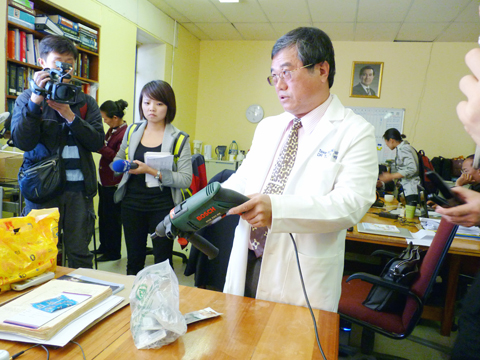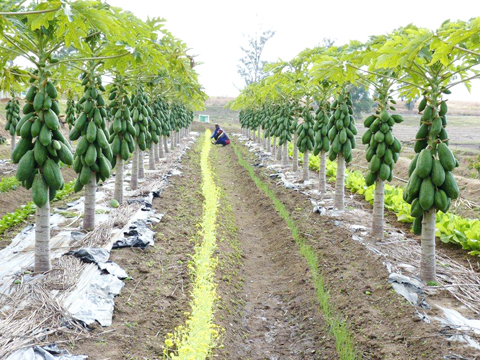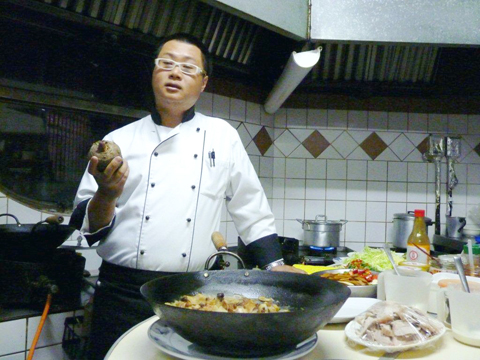|
¡@
From doctors with drills to chefs:
helping Swaziland
By Shih Hsiu-chuan
STAFF REPORTER , SWAZILAND
Tuesday, Jul 27, 2010, Page 3

Tu Chi-cheng, chief doctor at Taiwan¡¦s medical
mission in Swaziland, on July 18 shows the electrical drill he used during brain
surgeries two years ago, before the country purchased its first and only medical
drill.
PHOTO: SHIH HSIU-CHUAN, TAIPEI TIMES
In a country with scarce medical resources, an electric drill designed for
construction can be put to very different uses ¡X including brain surgery.
Such a situation actually happened about two years ago in Swaziland, which back
then didn¡¦t have a single craniotomy drill. A neurosurgeon¡¦s ingenuity saved
many people¡¦s lives, but it also brought the issue of the lack of medical
equipment to light and forced the government to make it a priority.
The operations were performed by Tu Chi-cheng (§ùÄ~¸Û), a neurosurgeon who had to
come up with imaginative ways to open skulls quickly when the only instruments
to hand were primitive ¡X a cranial hand drill and a hand jigsaw he had brought
with him from Taiwan.
His first surgery using the crude instruments took him close to five hours ¡X far
too long when patients with brain injuries are often in critical condition, he
said.
¡§I thought an electric drill might do the job and reduce time,¡¨ Tu said.
¡@

Two Swazis work at a farm operated by a
Taiwanese agricultural mission in the Manzini, Swaziland¡¦s largest city and its
commercial hub, on July 18.
PHOTO: SHIH HSIU-CHUAN, TAIPEI TIMES
Tu practiced drilling holes on thin layers of wood, but the idea of drilling a
hole in someone¡¦s skull with the instrument made many people uncomfortable.
One man was scared away when Tu, walking down a street with the electric drill,
told him he was not a carpenter, but a surgeon.
¡§The man thought I was nuts,¡¨ he said.
Convincing nurses that the practice was safe also required some work, especially
over concerns of infection.
Since then, Tu has performed more than 20 surgeries using the electric drill out
of a total of more than 200 surgeries he has performed since he became head of
the Taiwanese medical team in Swaziland in July 2008.
¡@

Camby Lee, a chef for Swazi King Mswati III,
talks with reporters while preparing yam chicken, one of the king¡¦s favorite
dishes, on July 18.
PHOTO: SHIH HSIU-CHUAN, TAIPEI TIMES
Swaziland now has a craniotomy drill, at a cost of 1.5 million Lilangeni
(US$202,000) ¡X one for the entire country.
The medical mission, which is led by Taipei Medical University (TMU), is the
latest addition to Taiwan¡¦s aid projects in Swaziland. It arrived in the country
about two years ago and already it has received much acclaim for its
contribution.
On Monday last week, when receiving Taiwanese volunteers and reporters, Swazi
Prime Minister Barnabas Sibusiso Dlamini praised the medical team for ¡§doing a
very good job.¡¨
¡§Dr Tu has saved a number of patients who would be in another world if he had
not done the work,¡¨ Dlamini said.
He said that ¡§all [other] missions that Taiwan has sent to Swaziland have had a
positive effect in raising the standard of living of its people.¡¨
A nurse in charge of the casualty department at the Mbabane Government Hospital
¡X Swaziland¡¦s biggest, where the TMU medical mission is stationed ¡X told
Taiwanese reporters: ¡§We are so grateful to the Taiwanese.¡¨
¡§They send doctors to help us, receiving a lot of patients. Before that, we used
to transfer our patients to South Africa, but now we no longer need to transfer,
especially for neurology treatment. Taiwanese missions have helped us improve
our equipment,¡¨ the nurse said.
Since Taiwan¡¦s medical mission arrived in Swaziland, its government has
maintained the budget for medical care despite a dire fiscal situation that is
only getting worse.
¡§This development is a testament to [the Swazi government¡¦s] recognition of the
contribution made by Taiwanese medical teams in the country,¡¨ Taiwanese
Ambassador to Swaziland Peter Tsai (½²©úÄ£) said.
Taiwan began dispatching agricultural missions to Africa in 1960, to help
modernize the agricultural sector and to garner support for the country¡¦s
representation at the UN.
The first mission to Swaziland was in 1969, a year after the two countries
established diplomatic relations. The same day, Swaziland gained independence
from Britain.
The agricultural missions assisted smallholders, allowing them to expand corn
and sweet potato production and to introduce other staple foods, such as fruit
and vegetables. The missions have also provided vocational training in
handicrafts, sawing, plumbing and electrical skills, computers, and have helped
improve sanitation and access to drinking water.
Aside from the public welfare programs, which Taiwanese technical missions
perform in 28 countries, another project, specific to Swaziland ¡X the last
absolute monarchy in Africa, ruled by King Mswati III ¡X is the ¡§Royal Project.¡¨
The project ¡§was set up with the purpose of consolidating diplomatic relations,¡¨
Yeh Chang-ching (¸±`«C), leader of the Taiwan Technical Mission in Swaziland,
told reporters.
Under the program, several specialists from the Technical Mission have been
stationed in three farms owned by the Swazi royal family, helping them introduce
new crops, improve cultivation techniques and train farm and husbandry
specialists.
¡§It¡¦s a roaring success ... we have turned the royal family¡¦s estates from
cattle farms to profitable farms on which various crops are grown,¡¨ Yeh said.
Having served in technical missions for 19 years in various countries, Yeh said
helping smallholder farmers in developing countries boost agricultural
production alone was not enough to contribute to poverty alleviation and food
security.
¡§Because of a lack of irrigation water, almost all of Swaziland¡¦s land is
rain-fed. There have been cases where efforts made to increase crop production
over a number of years turned to nothing overnight because of droughts that hit
Swaziland every few years,¡¨ he said.
Last year, to combat the problem, the mission experimented with planting
strawberries and tried to establish distribution channels in South African
markets in collaboration with Taiwanese businesspeople based there.
¡§If we manage to plant strawberries and have a sufficient number of marketing
channels, we will encourage local farmers to turn to cash-crop cultivation. That
would significantly boost their incomes,¡¨ Yeh said while showing reporters
around a strawberry field at a farm in Manzini, Swaziland¡¦s largest city and its
commercial hub.
The role played by the missions in Swaziland is a means for Taiwan to
demonstrate its value to the world in the face of Chinese repression of its
international space.
¡§Diplomatic relations [between the two counties] is not just at a political
level,¡¨ Dlamini said. ¡§The friendship has been strengthened, widened and
deepened by the missions.¡¨
Aside from the missions that are stationed permanently in Swaziland, various
groups of students and teachers volunteer in the country.
This month alone, a group of students and teachers from TMU, National Taiwan
University and National Changhua Senior High School arrived to teach a one-week
course on parasitology and nutrition to students at the University of
Swaziland¡¦s Faculty of Health Science.
A team from Changhua Senior High School, organized by Lewis Lu (§f¿³©¾), the
school¡¦s library director, also volunteered for a third consecutive year.
At an event on Friday initiated by Heart for Africa, a Canada Revenue
Agency-registered charity working for orphans and vulnerable children in Kenya
and Swaziland, students donated a blanket to each of the 15,000 orphans invited.
The students also participated in a project funded by an American to build an
orphanage on a 100,000km² patch of land that would be able to accommodate 2,000
orphans, Lu said.
¡§There¡¦s an estimated 200,000 orphans in Swaziland because of the highest
prevalence rate of HIV in the world. We were there mowing the lawn, planting
trees and painting ... we hope that all the orphans can be taken care of in an
orphanage one day,¡¨ he said.
Diplomacy with Swaziland also comes in the form of gourmet food.
About two months ago, Camby Lee (§õ©Ó°a), who graduated from National Kaohsiung
Hospitality College (KHC) a few years ago, started working as a chef for King
Mswati III.
The king has a culinary team of between 20 and 30 people, and Lee is the only
one cooking Chinese food. Before Lee, other former KHC students filled the
position.
Originally working in a Chinese restaurant in Taichung, Lee said he had adjusted
his flavors in Swaziland so that his dishes meet the king¡¦s tastes.
¡§[The king] prefers heavy flavors, more salty, more sweet and more sour.
Usually, I add an additional two or three spoons of salt, more than I put in
back home,¡¨ Lee said.
The 27-year-old said he really ¡§appreciated the rare opportunity¡¨ to serve as a
chef to the king, as ¡§there are not many monarchs left today.¡¨
The best way to win hearts and minds, Lee said, is through the stomach.
¡@
|
![]()
![]()
![]()